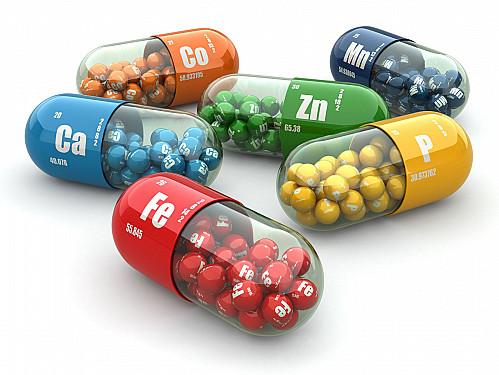Have you ever wondered if you need a vitamin or mineral supplement to boost your health? With so many options available on the market, it’s easy to feel overwhelmed and unsure of what your body really needs. In this article, we will explore the benefits of vitamin and mineral supplements, discussing whether they are necessary for everyone or if a balanced diet can provide all the necessary nutrients your body needs. By the end, you’ll have a clear understanding of whether or not you should consider reaching for that bottle of supplements.

This image is property of img1.wsimg.com.
What are vitamins and minerals?
Definition
Vitamins and minerals are essential nutrients that our bodies need in small amounts to function properly. They play a crucial role in maintaining overall health and well-being.
Types of vitamins
Vitamins are organic substances that are necessary for various bodily functions. There are 13 vitamins classified into two categories: fat-soluble vitamins and water-soluble vitamins.
Fat-soluble vitamins include vitamins A, D, E, and K. These vitamins are stored in the body’s fatty tissues and liver and are absorbed by fat. Water-soluble vitamins, on the other hand, are not stored in the body and need to be replenished regularly. The water-soluble vitamins are vitamin C and the eight B vitamins: thiamin, riboflavin, niacin, pantothenic acid, biotin, vitamin B6, vitamin B12, and folate.
Types of minerals
Minerals are inorganic substances that are needed for various physiological functions. There are two types of minerals: macrominerals and trace minerals.
Macrominerals, such as calcium, magnesium, potassium, phosphorus, sodium, and chloride, are needed in larger amounts by the body. Trace minerals, including iron, zinc, copper, manganese, selenium, iodine, and molybdenum, are required in smaller amounts.
Factors to consider
Age
Your age is an important factor to consider when determining your vitamin and mineral needs. As you age, your nutrient requirements may change. For example, older adults may require more vitamin D and calcium to maintain bone health.
Gender
Gender also plays a role in the type and amount of vitamins and minerals your body needs. For instance, women of childbearing age need more iron to compensate for menstrual blood loss, while men require more zinc for reproductive health.
Health conditions
Certain health conditions can affect your body’s ability to absorb or utilize specific vitamins or minerals. Individuals with conditions like celiac disease or Crohn’s disease may have difficulty absorbing nutrients from food, leading to deficiencies.
Dietary restrictions
If you follow a restrictive diet, such as a vegetarian or vegan diet, you may be at risk of certain vitamin and mineral deficiencies. For instance, strict vegetarians may need to supplement with vitamin B12, as it is primarily found in animal products.

This image is property of www.unlockfood.ca.
Signs of vitamin or mineral deficiency
Fatigue
Experiencing persistent fatigue and low energy levels could be a sign of vitamin or mineral deficiency. Nutrients like iron, vitamin B12, and magnesium play a crucial role in energy metabolism.
Weakness
Weakness and muscle fatigue can be a result of inadequate intake of vitamins and minerals. Electrolytes like sodium, potassium, and magnesium are essential for proper muscle function.
Hair loss
If you notice excessive hair loss or thinning, it could be a potential sign of vitamin or mineral deficiency. Nutrients like vitamin D, iron, zinc, and biotin are vital for hair health.
Brittle nails
Brittle nails that easily break or peel may indicate a lack of certain vitamins and minerals. Nutrients like biotin, iron, and zinc support nail strength and growth.
Cognitive difficulties
Deficiencies in certain vitamins and minerals can affect brain function and cognitive abilities. For example, inadequate intake of vitamin B12 and folate has been linked to memory loss and cognitive decline.
Risks of vitamin or mineral deficiency
Weakened immune system
A deficiency in vitamins and minerals can weaken the immune system, making you more susceptible to infections and illnesses. Nutrients like vitamins A, C, D, E, and zinc are crucial for immune function.
Impaired growth and development
Children and adolescents who do not consume enough vitamins and minerals may experience impaired growth and development. Nutrients like calcium, vitamin D, and zinc are essential for proper bone growth.
Increased risk of chronic diseases
Chronic deficiencies in certain vitamins and minerals have been associated with an increased risk of chronic diseases. For example, low levels of vitamin D have been linked to an increased risk of osteoporosis, heart disease, and certain types of cancer.

This image is property of cloudfront-us-east-1.images.arcpublishing.com.
Sources of vitamins and minerals
Whole foods
Obtaining vitamins and minerals from whole foods is generally the best way to meet your nutritional needs. Fruits, vegetables, whole grains, lean proteins, and dairy products are excellent sources of a wide range of nutrients.
Fortified foods
Fortified foods are products that have had specific vitamins or minerals added to them during processing. Examples include cereals, bread, and milk fortified with extra vitamins and minerals.
Supplements
Supplements are available in various forms, including tablets, capsules, and powders. They can provide concentrated amounts of specific vitamins or minerals. However, they should not replace a balanced diet and are best used to complement a healthy eating plan.
Benefits of obtaining vitamins and minerals from whole foods
Better absorption
When you obtain vitamins and minerals from whole foods, they are often in a form that is easily absorbed and utilized by your body. Whole foods also contain other compounds that can enhance nutrient absorption.
Additional nutrients
Whole foods provide a combination of vitamins, minerals, fiber, and other beneficial compounds that work synergistically to support optimal health. Supplements, on the other hand, typically provide isolated nutrients without the other accompanying nutrients.
Natural balance
Whole foods naturally provide the right balance of vitamins and minerals, ensuring that you don’t consume excessive amounts of certain nutrients. This natural balance is important for maintaining overall health and preventing nutrient imbalances.

This image is property of domf5oio6qrcr.cloudfront.net.
When is a supplement necessary?
Inadequate dietary intake
If you have dietary restrictions or follow a specific eating plan that limits your intake of certain food groups, you may require a supplement to fill the nutritional gaps. For example, vegetarian or vegan individuals may need to supplement with vitamin B12 due to its primarily animal-based sources.
Specific health conditions
Certain health conditions can increase your nutrient needs or interfere with nutrient absorption. People with conditions like malabsorption disorders or chronic kidney disease may require specific vitamin or mineral supplements to ensure optimal levels.
Pregnancy or breastfeeding
During pregnancy and breastfeeding, the nutritional needs of both the mother and the baby increase. Supplements such as prenatal vitamins are often recommended to ensure adequate intake of essential vitamins and minerals for fetal development and maternal health.
Types of vitamin and mineral supplements
Multivitamins
Multivitamins contain a combination of essential vitamins and minerals. They are popular as they provide a wide spectrum of nutrients in one convenient dose. Multivitamins are available in various formulations to meet the specific needs of different age groups and genders.
Individual vitamins
Individual vitamin supplements contain higher doses of a specific vitamin. These supplements are useful for individuals who have a known deficiency in a particular vitamin or require higher amounts due to specific health conditions.
Individual minerals
Individual mineral supplements provide a concentrated dose of a specific mineral. They are beneficial for individuals who have a diagnosed deficiency in a particular mineral or require additional supplementation due to specific health concerns.

This image is property of news.okstate.edu.
How to choose a quality supplement
Look for third-party testing
Choose supplements that have been tested by third-party organizations to ensure their safety and quality. Look for certifications from reputable organizations like the US Pharmacopeia (USP) or NSF International.
Check for certifications
Certifications such as Good Manufacturing Practices (GMP) ensure that the supplement has been manufactured following strict quality control standards. These certifications offer reassurance that the product has been produced in a safe and reliable manner.
Consider bioavailability
Bioavailability refers to the extent to which a nutrient is absorbed and utilized by the body. Look for supplements that contain highly bioavailable forms of vitamins and minerals to maximize their effectiveness.
Consulting with a healthcare professional
Importance of professional advice
Before starting any new supplement regimen, it’s always best to consult with a healthcare professional, such as a doctor or registered dietitian. They can assess your individual needs, analyze your diet, and recommend appropriate supplements, if necessary.
Dosage recommendations
A healthcare professional can provide personalized dosage recommendations based on your specific needs and health status. They can help you determine the appropriate doses of vitamins and minerals to supplement with to avoid deficiencies or excess intake.
Potential interactions
Certain medications or health conditions can interact with vitamins and minerals, potentially leading to adverse effects. A healthcare professional can help identify any potential interactions and recommend suitable supplements that are safe for you to take.
In conclusion, vitamins and minerals are essential nutrients that play a crucial role in maintaining overall health. While obtaining these nutrients from whole foods is always ideal, there are situations where supplements may be necessary. Factors such as age, gender, health conditions, and dietary restrictions can impact your nutrient needs. It is important to be aware of the signs of deficiency and the risks associated with inadequate intake. When choosing supplements, considering third-party testing, certifications, and bioavailability can help ensure their quality and effectiveness. Consulting with a healthcare professional is recommended to receive personalized advice, dosage recommendations, and guidance on potential interactions. By prioritizing the importance of obtaining vitamins and minerals from both whole foods and quality supplements when necessary, you can support your overall well-being and maintain optimal health.
